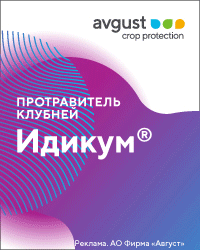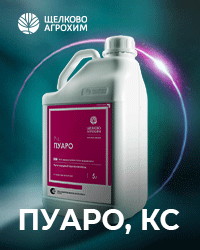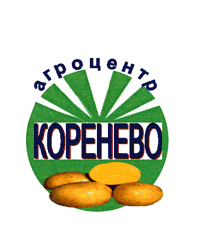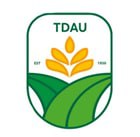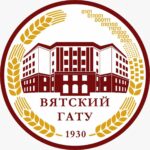UDC 632.93; 631.53.01; 632.4.01/.08
K.L. Alexeeva, D.N. Baleev, A.F. Bukharov, A.R. Bukharova, M.I. Ivanova
Summary. Fungi of the genus Alternaria can cause great damage to seeds of umbelliferous crops, and therefore reduce the seed sowing quality. The results of the research of fungal diseases of seeds are presented and methods of analysis are discussed. The use of biological preparation Planriz allowed to raise the efficiency of seed desinfection to about 67.5 – 71.3% value.
Keywords: Alternaria, seeds, seed germination, Apiaceae (Umbellifeare), environmental conditions, preparations.
Seed quality can be significantly reduced because of diseases. One of the most common diseases of Apiaceae vegetable crops, transmitted with seeds is alternariosis (Alternaria radicina). These diseases cause lodging of seedlings [1, 2, 4]. The planting of the infected seeds promotes the spread of harmful organisms from one place to another.
The purpose of the present study was the analysis of the microfungi conta-mination of vegetable seeds of Apiaceae, as well as the evaluation of the effectiveness of biological preparations for disinfection of seeds.
Methodology. We used fennel and parsnip seeds a harvested in 2008-2011, grown by standard non-fungicide techniques in the experimental plot of All-Russian Research Institute of Vegetable Growing. Analyses of seeds for infection were performed by standard laboratory methods. Sowing was carried out on the potato-glucose agar medium in a humidified chamber. The culture was then incubated at temperature 24 — 25 °C. The seed infection control was performed at 3, 6, 9 days.
Comparative assessment of biological efficiency was performed by seed treatment according to the following plan: 1 – (control) – water; 2 – Planriz (6 hours in a 1% solution of the preparation); 3 — Alirin-B (2 hours in 0.1% solution of the preparation); 4 – Trichodermin (3 hours in a 1% solution of the preparation). The fennel seeds (2010 crop), and parsnip seeds (2009 crop) with high contamination were used. Repeated experience was 3-fold, the sample size – 100 seeds. The quality of seeds was tested determined according to [3].
Results and discussion. The main type of infection of the Umbelliferae seeds is Alternaria radicina. The infection causes the complete suppression of seed germination as well as damages root collars of seedlings leading to their death. Heavily infested seeds in wet conditions under the 3 — 4 hours store are usually covered by gray-brown patina, representing the mycelium and spores of the fungus. These seeds do not germinate or produce weak seedlings which are stunted. This is most clearly manifested in the seed germination experiments with grain agar clean culture which stimulates the growth of Alternaria. Infestation of the analyzed samples of seeds and seedlings reached 80% (Fig.).
Alternaria pathogens are characterized by wide amplitude of natural variability and are well adapted to changes of environmental conditions, including the pesticide stress. The presence of small amounts of Alternaria spores on the surface of seeds does not adversely affect the growth and the development of seedlings. Harmfulness of fungi of the genus Alternaria is associated with their biological characteristics. They have high enzymatic activity. The linear growth of the colonies on grain agar depending on the species was 3-6 mm per day. The spores of the fungus can survive in the soil for several years without loss of viability. The spread of infection is carried by air. The maximum concentration of spores of this fungus in the air in the Moscow region was registered in July and August.
Comparative evaluation of analytical methods showed that for the detection of Alternaria on the Umbelliferae seeds the paper rolls are the most suitable. To accelerate the spore germination and to fix the Alternaria spores, seeds were placed on damp filter paper in a drop of potato starch.
Parsnip seeds obtained in different years also differ in their infectiousness. The seeds of 2008 and 2010 crop were slightly damaged by the infection (within 5-10%), while the seeds obtained in 2009 and 2011 years were significantly damaged (85 and 75% respectively). Sowing quality of seed collected in 2009 and 2011 was higher than collected in the 2008 and 2010 years. Seed vigor in all embodiments was 0%, and the laboratory germination ranged from 35 — 40%. Perhaps it is explained by the features of germination regime, or differences in the infection damage to the embryo of seeds of various plant species [1].
Significant contamination of fennel seeds occurred in 2010 (80%) with the low quality of the crop (10% energy germination, laboratory germination — 25%). Seeds, formed in 2008-2011, were slightly damaged – 10%. Energy and laboratory germination were 45-50 and 72-75%, respectively.
Fennel and parsnip seeds in experiments on seed decontamination. The treatment was performed using seeds soaked in solutions of biological preparations. The best results on both cultures were obtained in the embodiment with Planriz (soaking the seeds for 6 hours in a 1% solution). Biological efficiency was 67,5-71,3%. The germination of the treated seeds increased 1,6-2 once to control.
The phytopathological control and pathogen diagnostics of Umbelliferae vegetable seeds are important components of the sowing quality evaluation system. The use of seeds free from Alternaria infection is one of the proven methods of alternariosis profilactics. Planriz can be used for disinfection of seeds.
References
- Alexeeva K.L., Smetanina L.G., Kulakov G.V. Al’ternariozy semjan i mikrobiologicheskij sposob snizhenija ih vredonosnosti (Alternarioses of seeds and microbiological methods of increase of their damageability), Sovremennye sistemy zashhity rastenij ot boleznej i perspektivy ispol’zovanija dostizhenij biotehnologii i gennoj inzhenerii, VNIIF, 2003, pp. 139-140.
- Baleev D.N., Bukharov A.F., Bukharova A.R., Khovrin A. N., Devyatov A.G., Leunov V.I., Yurkovsaya M.E. The reasons behind the low quality of carrot seeds, Potato and Vegetables, 2015, No.11, pp. 31-33.
- International Rules for Seed Testing. Bassersdorf. Switz., 2011, 68 p.
- Tylkowska К., Grabarkiewicz-Szczesna J., Iwanowska H. Production of toxins by Alternaria alternata and Alternaria radicina and their effects on ger-mination of carrot seeds, Seed Science and Technology, 2003, 31(2), pp. 309-316.
About authors
K.L. Alekseeva, DSc.,
chief scientist. Plant protection group. All-Russian Research Institute of Vegetable Growing.
E-mail: alexenleon@yandex.ru
D.N. Baleev, PhD,
senior scientist. Seed research group – Centre of breeding and seed growing. All-Russian Research Institute of Vegetable Growing.
E-mail: dbaleev@gmail.com.
A.F. Bukharov, DSc,
chief scientist. Seed research group – Centre of breeding and seed growing. All-Russian Research Institute of Vegetable Growing.
E-mail: afb56@mail.ru.
A.R. Bukharova, DSc,
professor, deputy dean of Agronomical faculty of Russian State Agrarian Correspondence University.
E-mail: chem@rgazu.ru.
M.I. Ivanova, DSc,
chief scientist. Greens crops selection group – Centre of breeding and seed growing. All-Russian Research Institute of Vegetable Growing.
E-mail: ivanova_170@mail.ru.
Против альтернариоза семян
Алексеева Ксения Леонидовна, доктор с.-х. наук, гл.н.с. группы защиты растений и грибов, ФГБНУ ВНИИО. E-mail: alexenleon@yandex.ru.
Балеев Дмитрий Николаевич, канд. с.-х. наук, с.н.с. группы семеноведения и первичного семеноводства овощных культур, ФГБНУ ВНИИО.
E-mail: dbaleev@gmail.com.
Бухаров Александр Федорович, доктор с.-х. наук, в.н.с. группы семеноведения и первичного семеноводства овощных культур, ФГБНУ ВНИИО.
E-mail: afb56@mail.ru.
Бухарова Альмира Рахметовна, доктор с.-х. наук, профессор, заместитель декана агрономического факультета ФГБОУ ВПО РГАЗУ. E-mail: chem@rgazu.ru.
Иванова Мария Ивановна, доктор с.-х. наук, главный научный сотрудник группы селекции зеленных культур, ФГБНУ ВНИИО. E-mail: ivanova_170@mail.ru.
Патогены из рода Alternaria могут наносить большой ущерб семеноводству овощных культур семейства сельдерейных, снижая выход семян и ухудшая их посевные качества. Представлены результаты фитоэкспертизы семян сельдерейных, обсуждены методы анализа. Установлена эффективность (67,5–71,3 %) биопрепарата планриз для обеззараживания семян.
Ключевые слова: Alternaria, семена, прорастание семян, зонтичные, экологические условия, препараты.
Биопрепараты против альтернариоза семян (реферат)
Представлены результаты фитоэкспертизы семян пастернака и укропа, обсуждены методы анализа. Установлена эффективность (67,5–71,3%) биопрепарата Планриз для обеззараживания семян.
Основной вид инфекции на семенах культур семейства Umbelliferae – Alternaria radicina. Воздействие инфекции выражалось либо в полном подавлении всхожести семян, либо в поражении корневой шейки проростков и их отмирании. Сильно зараженные семена во влажных условиях на 3–4 сутки покрываются серо-бурым налетом.
Сравнительная оценка методов анализа показала, что для выявления Alternaria на семенах зонтичных можно использовать метод бумажных рулонов, как наиболее простой. Для ускорения роста Alternaria и фиксации семян их помещали на влажную фильтровальную бумагу в каплю раствора картофельного крахмала.
Семена пастернака, полученные в разные годы исследований, различаются по зараженности. Если семена, собранные в 2008 и 2010 годах поражены незначительно, в пределах 5–10%, то семена, полученные в 2009 и 2011 годах, поражены уже значительно: инфекция составила 85 и 75% соответственно. Посевные качества семян урожая 2009 и 2011 годов выше, чем у семян урожая 2008 и 2010 годов. Энергия прорастания во всех вариантах составила 0%, а лабораторная всхожесть варьировала в пределах 35–40%. Возможно, это связано с режимом проращивания или повреждением зародыша семян [1].
Значительное заражение инфекцией семян укропа происходило в 2010 году (80%). При этом посевные качества находились на низком уровне (энергия прорастания 10%, лабораторная всхожесть – 25%). Семена, сформированные в 2008–2011 годах, были поражены слабо – 10%. Энергия прорастания и лабораторная всхожесть составила 45–50% и 72–75% соответственно.
В опыте по обеззараживанию семян были использованы семена укропа и пастернака. Обработку проводили путем замачивания семян в растворах биопрепаратов. Наилучшие результаты на обеих культурах были получены в варианте с биопрепаратом Планриз (замачивание семян в течение 6 часов в 1%-ном растворе препарата). Биологическая эффективность составила 67,5–71,3%. Всхожесть обработанных семян увеличилась в 1,6–2 раза к контролю. В системе оценки посевных качеств семян овощных культур, в том числе Umbelliferae, важное место занимает их фитопатологическая экспертиза и идентификация возбудителей. Для профилактики Alternaria необходимо использовать семенной материал, свободный от инфекции. При обеззараживании семян использовать биопрепарат Планриз и его аналоги.
К.Л. Алексеева, Д.Н. Балеев, А.Ф. Бухаров, А.Р. Бухарова,
М.И. Иванова.

